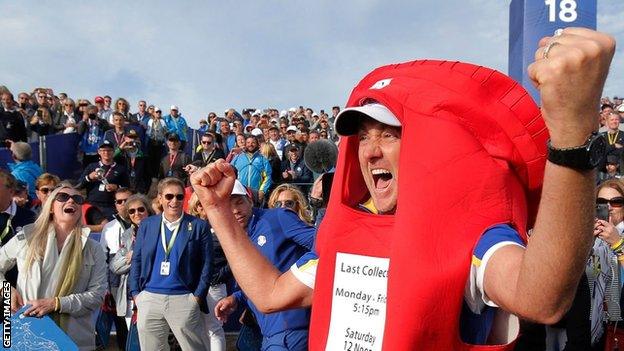LIV Golf Invitational: Centurion Club to host event that threatens to blow apart elite men's golf
- Published
- comments

Ian Poulter donned a postbox outfit after helping Europe beat the US in the 2018 Ryder Cup in Paris
Ian Poulter wept as he hugged his son Luke on the 18th green at Le Golf National.
The Englishman had just completed victory over Dustin Johnson to take Europe to within a point of what was now inevitable Ryder Cup success over the United States.
"That's why you practise so hard, son," Poulter whispered into the youngster's ear as they embraced on that putting surface - for glorious moments like that one nearly four years ago.
It seems a distant memory now.
This week Poulter puts at risk the chance of ever again enjoying the unique sporting glory that makes the Ryder Cup the most popular golf event on the planet.
It is a match where not a penny is exchanged. It is about the winning, losing and taking part. It is top-level sport in its purest form.
Instead the man they call Mr Ryder Cup - The Postman who always delivers for his continent - is one of those on the receiving end. And he has said yes to an offer that in monetary terms is too good to refuse.
This week the 46-year-old returns to his native Hertfordshire, in defiance of the established tours where he has plied his trade with distinction for two and half decades, with a swollen back pocket brimful of Saudi Arabian cash.
He is one of 48 players who will compete at the Centurion Club, 30 miles north of London, in the opening tournament in the LIV Golf Invitational Series, a project fronted by former world number one Greg Norman.
It threatens to blow apart elite level men's professional golf.
He joins fellow Ryder Cup heroes such as Lee Westwood, Sergio Garcia, Graeme McDowell and Martin Kaymer - the German who so thrillingly capped the 'Miracle at Medinah' 10 years ago.
Forget the glory - although we never will. Now it is all about the money and there is loads of it to go round.
Ironically Johnson, the man Poulter beat in France, is the headline act, for a reported signing-on fee of $150m (£119m). That's before competing in the first of eight $25m events that offer a first prize of $4m and last place money worth $120,000.
This is a big-money power struggle where Saudi Arabian riches afforded by the Kingdom's vast Public Investment Fund (PIF) are aimed at blowing up the status quo and rewriting golf's future.
And before we get too romantic regarding the comparative innocence and sporting purity of the Ryder Cup, we should also remember that professional golf, in its essence, has always been about financial rewards.
The very first money matches of the 19th century, big betting affairs, led into the establishment of tournaments that paid prize money.
They evolved into formalised circuits that led to the setting up in 1968 of the PGA Tour and that itself was a breakaway from the Professional Golfers' Association.
For decades this preeminent tour seemed an untouchable force, keeping the less lucrative European Tour in its place and fighting off Norman's first attempt to institute a World Tour in the mid-1990s.
But now the Australian is back and with an extremely well-financed vengeance. Both the PGA Tour and DP World Tours refused their players waivers to allow them to compete in Norman's series.
Poulter and co are liable to sanctions, possible bans and fines, for taking part - although none are likely to be known until the players tee it up on Thursday. Future Ryder Cup roles are in jeopardy for some of the true legends of the biennial match.
It is a contest that particularly helps sustain the DP World Tour - formerly known as the European Tour - and while its future is not in any doubt, the characters who have been at its heart may be missing.
More immediately the LIV impact is being felt in the US. Kevin Na, the 37-year-old American, has resigned from the PGA Tour to effectively take himself out of scope for potential punishment for joining the LIV project.
Some scoff that he is a relative nonentity with a reputation for slow play and is no loss. But that ignores the significance of his unprecedented move.
A player who has banked more than $37m in prize money has now turned his back on what was the most lucrative circuit in professional golf.
The PGA Tour, like most golf bodies, does not do frantic but there is no doubt it is busy drawing up its next moves knowing that expensive litigation seems inevitable and that its opponents have extraordinarily deep pockets.
Its European counterpart is bound by a formal strategic alliance and the jury is out as to whether that is a source of strength or leaves it relatively powerless, hamstrung and beholden to its American partner.
There is some disquiet among rank and file players on the European circuit, concerned at limited playing opportunities through the summer months.
"Players aren't happy at all," a DP World player told me last week. "We are being sold down the river."
He pointed to a diminishing number of lucrative Rolex Series events and that next month's Scottish Open is now jointly sanctioned with the PGA Tour, severely limiting the number of home players able to take part.
Then there is the moral dimension of the LIV series. Few players have spoken out against Saudi Arabian funding, but it is a regime accused of sportswashing a Kingdom heavily criticised for its record on human rights.
Whataboutery has become increasingly prevalent. What about Europe's tie-in with DP World, historic links with the Middle East and the PGA Tour's business dealings with China?
What about Saudi Arabia's incursions into other sports such as Formula 1, its ownership of Newcastle United and staging huge boxing events?
The difference here is that they have not sought to shake up those sports in quite the way they are trying to do with golf. This is an existential threat to the status quo.
LIV are ripping up the way that the professional game is played. Fifty-four (LIV in Roman numerals) rather than 72 holes, a simultaneous 'shotgun' start to reduce the TV viewing window to more manageable proportions and a team element.
This, they claim, will lead to team franchises - Indian Premier League style - an influx of money and for Saudi Arabia, ultimately, a return on their massive near £2bn investment. Norman says he will have a 14-tournament super league up and running by 2024.
If they have been able to turn Johnson's head fewer than three months after the former Masters and US Open winner emphatically pledged allegiance to the PGA Tour, who else might follow?
At the moment the LIV cast list is populated with fading stars nearing the end of their careers, Richard Bland as well as those former Ryder Cup stalwarts, and younger hopefuls looking for financial security.
But what happens to the likes of Oli Fisher, Sam Horsfield and Laurie Canter if bigger names are finally attracted? Yes, they've had a decent payday but will they have anywhere to play thereafter? Maybe the Asian Tour which is now backed by LIV and held its first event outside the continent at Slaley Hall in Northumberland last weekend - which is another headache for DP World Tour chief Keith Pelley.
Another big unknown right now is if the fans have bought into the new event. Three-day ground passes have sold out, according to the LIV website. Over the weekend Westwood and Bland both tweeted out promotional codes offering free day tickets to the first 100 who signed up. As of Monday lunchtime, the codes were still working.
These are tumultuous times, unforeseeable when Poulter so emotionally embraced his son and basked in the unadulterated joy of pure sporting success in 2018.
By contrast it is difficult to see where the glory lies in this week's event near Hemel Hempstead. The organisers insist it is in London for global impact, the sort of marketing distortion that goes with business in its purest form.
Yes, money has always been the prime driver in the professional game. But, make no mistake, golf has never quite had a week like the one upon which it is currently embarking, never mind the fallout to come.


